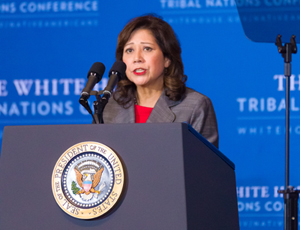
Labor Secretary Hilda Solis announced on Jan. 9 that she would step down from the top post at the Labor Dept., although she did not specify when she would leave.
Solis is known for her tough enforcement approach. In a Jan. 9 letter to DOL employees, Solis said the agency’s enforcement and informal resolution programs “resulted in the recovery of almost $5 billion for retirees and their families.”
Moreover, in 2012, the Labor Dept. conducted “the largest number of investigations” into overtime and other owed leave back-wages and “collected more than $280 million on behalf of more than 300,000 workers denied their rightful pay, overtime or leave benefits.” Also under her leadership, the Occupational Safety and Health Administration levied its largest fine in its history, against BP for failing to fix safety problems that led to the 2005 Texas City refinery disaster.
In a statement, President Obama said, “Her efforts have helped train workers for the jobs of the future, protect workers’ health and safety and put millions of Americans back to work.”
She had solid support from Democrats and labor unions. Terry O'Sullivan, general president of the Laborers International Union of North America (LIUNA), says, "She was one of the finest labor secretaries we've ever had. She was devoted; she was tireless." O'Sullivan says the Labor Dept. during her tenure hired some 700 new inspectors to enforce worker protections at jobsites. That was a stark contrast to the George W. Bush administration, which "was negligent in hiring investigators and in enforcing worker safety and wage protections," O'Sullivan says.
Steve Rank, executive director of safety and health for the Iron Workers International Union, said the union, led by General President Walter Wise, was a “staunch supporter” of Solis and her efforts to create a safer workplace. Rank says Solis was responsive to the Iron Workers’ request to develop new regulations relating to reinforcing steel and post-tensioning activities on construction projects. The Office of Management and Budget (OMB) this year approved Solis’s petition to move forward on developing a regulation, which has not been updated since 1971, Rank says.
But business groups have often chafed at Solis’s approach. Mike Kennedy, general counsel for the Associated General Contractors of America, says, "Our experience with the Labor Dept. under her stewardship has been uneven." Some departments have been open to discussion about business issues, while others have been less so, he says. "Overall, what we have found most troubling was a tendency to confuse enforcement with compliance. We saw a big increase in enforcement activity, but we did not see a comparable effort to provide assistance, particularly to small businesses, to ensure that the rates of voluntary compliance went up," he says.
In its semi-annual agenda, released on Dec. 21, 2012, the agency said final action on the proposed “persuader” regulation was expected by April 2013.
The new rule is strongly opposed by business groups, including the Associated Builders and Contractors and the U.S. Chamber of Commerce. It would implement new reporting requirements under the Labor Management Reporting and Disclosure Act whenever any outside party—including legal counsel—helps the employer communicate with its employees.


Post a comment to this article
Report Abusive Comment